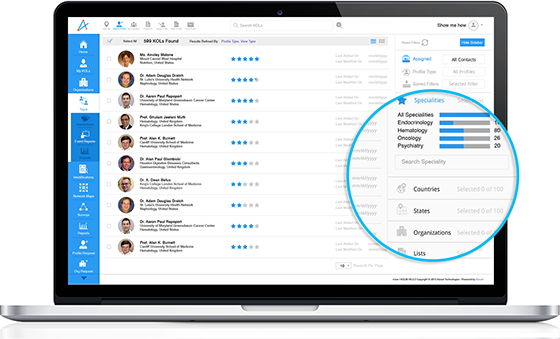12 Feb 2025
Boosting Healthcare Outcomes with Effective HCP Engagement Software

Healthcare is evolving rapidly, and at the heart of this transformation lies the crucial role of Healthcare Professionals (HCPs).
These experts deliver care and serve as influential drivers in adopting new medical practices, therapies, and technologies, ultimately impacting patient outcomes in healthcare. Engaging HCPs effectively is critical for ensuring that the latest advancements reach patients and improve healthcare outcomes.
However, the traditional methods of HCP engagement fall short in today’s data-driven environment. Challenges like fragmented communication, limited insights into HCP needs, and inefficient resource allocation hampers the ability to build meaningful and impactful relationships. This is where modern HCP engagement software transforms how life sciences companies interact with HCPs, ensuring that innovations truly shape patient care outcomes.
In this article:
HCP Engagement in Improving Healthcare Outcomes
The connection between HCP engagement and healthcare outcomes is apparent. Engaged HCPs are likelier to adopt innovative treatments, share critical insights from clinical practice, and provide feedback that shapes the development of new therapies.
Effective engagement with HCPs directly impacts healthcare outcomes in the following ways:
Improved Patient Care
Engaged HCPs are equipped with the latest evidence-based information, enabling them to make informed clinical decisions that benefit patients. Personalized engagement ensures that HCPs receive relevant updates tailored to their specialties.
Faster Adoption of Innovations
New therapies, medical devices, and treatments require endorsement from trusted HCPs. Engaging with these professionals helps to accelerate the adoption of innovations within the medical community.
Enhanced Collaboration
Collaboration between life sciences companies and HCPs fosters knowledge sharing, clinical research participation, and the development of best practices. This synergy enables continuing improvements in patient outcomes.
Insights for Improved Decision-Making
Engaged HCPs provide valuable feedback on therapy efficacy, patient experiences, and unmet real-world needs. These insights guide the development of new strategies, treatments, and healthcare solutions.
Importance of HCP Engagement
HCPs play a central role in the healthcare ecosystem, bridging medical advancements and patient care. Engaging HCPs effectively is a strategy for life sciences companies that allows for the seamless integration of new modalities into clinical practice.
When HCPs are engaged:
1. Knowledge Dissemination Improves : HCPs informed about the latest research, drug developments, and clinical guidelines, allowing them to make evidence-based decisions.
2. Expanded Collaborative Networks : HCPs share insights with peers, institutions, and stakeholders, amplifying the impact of medical advancements.
3. Feedback Enhances Innovation : HCPs offer valuable insights into patient needs, treatment challenges, and therapy efficacy. These insights enable organizations to refine their offerings and develop patient-centered solutions.
Impact on Healthcare Outcomes
1. Improved Treatment Consistency : Effective engagement fosters uniformity in treatment approaches across different regions and institutions, reducing inconsistencies in patient care outcomes.
2. Stronger Public Health Impact : HCPs influence public health initiatives, such as vaccination drives, chronic disease management, and preventive care. Engaging them meaningfully expands the reach and effectiveness of these programs.
3. Better Crisis Management : Engaged HCPs are crucial during public health crises, such as pandemics, as they can disseminate accurate medical information quickly and counter misinformation within the community.
4. Enhancing Post-Market Surveillance : Effectively engaged HCPs actively work on real-world data on product performance and adverse events, contributing to continuous monitoring and improvements of medical products.
Challenges in Traditional Engagement Methods
With emphasis on the importance of HCP engagement, traditional methods are insufficient to catch up with the rapidly evolving healthcare landscape, hindering improvements in health outcomes.
1. Data Silos
More often than not, information about HCPs, their specialties, and engagement history is scattered across multiple systems and departments. This fragmentation makes it difficult to view the HCP profile comprehensively.
These silos also hinder effective collaboration and prevent the development of engagement strategies.
2. Lack of Personalization
Generic and one-size-fits-all messages fail to address the unique needs and preferences of individual HCPs.
This lack of personalization leads to disengagement, missed opportunities, and suboptimal communication with HCPs that fail to support desired healthcare outcome.
3. Inefficiency
Manual processes, fragmented communication channels, and a lack of centralized tools slow down engagement efforts.
Time and effort are wasted on repetitive tasks, while valuable opportunities to connect meaningfully with HCPs are not followed up.
4. Compliance Complexities
Traditional methods struggle to maintain transparency and adhere to evolving stringent regulatory requirements. Inconsistent documentation of HCP interactions can lead to compliance risks and missed audits and can lead to a failure in optimizing healthcare outcomes.
5. Difficulty in Measuring Impact
Without advanced analytics, life sciences teams lack the capability to measure engagement outcomes effectively.
Refining strategies, demonstrating return on investment (ROI), or adjusting approaches based on real-time insights are challenging without advanced capabilities.
Overcoming Challenges with HCP Engagement Solutions
Data Integration
One of the biggest hurdles in HCP engagement is fragmented and siloed data. Information about HCPs resides in multiple systems, such as CRM platforms, sales databases, and marketing tools, making it challenging to get a unified view of interactions.
Without this holistic perspective, achieving the healthcare outcomes that drive value across the organization is challenging.
Effective HCP engagement solutions address these issues by:
1. Centralizing Data
Combining fragmented sources into a single, comprehensive platform allows life sciences teams to access up-to-date and consistent information on HCPs. This connectivity ensures more streamlined engagement, ultimately influencing patient care outcomes.
2. Enhancing Visibility
A comprehensive 360-degree view of HCP profiles, including their preferences, engagement history, and affiliations, supports informed decision-making.
3. Facilitating Collaboration
Effective collaboration allows multiple teams, such as medical affairs and commercial teams, to collaborate cross-functionally, reducing redundancies and improving coordination between efforts.
4. Enabling Real-time Updates
Dynamic data integration ensures that changes in HCP roles, preferences, or affiliations are updated instantly. This action enhances engagement accuracy.
Personalization
A blanket solution is no longer sufficient for engaging HCPs meaningfully. Personalization is a key to building trust and fostering long-term relationships. Advanced engagement solutions tackle this challenge by:
1. Understanding HCP Needs
Advanced HCP engagement solution uses AI analytics to identify individual HCP preferences, specialties, and areas of interest. These insight guides targeted outreach, helping achieve desired health outcomes and ensuring patient-centric improvements.
2. Customizing Communication
Delivering tailored messages, content, and outreach strategies that resonate with specific HCPs yields better responses from HCPs.
3. Segmenting Audiences
Categorizing HCPs based on their roles, therapeutic areas, and influence levels creates a more targeted engagement plan.
Efficiency
Traditional HCP engagement methods are time-consuming and resource-intensive, leading to workflow inefficiencies that may limit improvements in health outcomes.
Modern engagement solutions drive efficiency by:
1. Automating Routine Tasks
Reduced manual efforts in scheduling, follow-up, and data entry, frees up time for more strategic activities.
2. Streamlining Workflows
Integrating tools and platforms that create a cohesive and efficient engagement process minimizes delays and redundancies. This operational clarity can contribute to more consistent patient care outcomes.
3. Prioritizing High-Value Interactions
Using data-driven insights to identify and focus on the most influential HCPs effectively allocates resources.
4. Improving Team Coordination
Centralized platforms enable seamless team collaboration, ensuring consistent messaging and unified team efforts.
Compliance
Navigating the complex regulatory landscape of HCP engagement is a significant challenge for life sciences. Effective HCP engagement software simplifies compliance by:
1. Tracking Interactions
Automatically logging all communications and interactions with HCPs maintains transparency.
2. Ensuring Regulatory Alignment
Built-in compliance features within HCP engagement software help adhere to industry regulations such as The Sunshine Act and other global standards.
2. Monitoring Spends
Effective engagement software keeps track of financial transactions and resources allocated to individual HCPs in order to ensure ethical practices.
Features of an Effective HCP Engagement Software
An effective HCP engagement software is designed to empower life sciences teams and pharma companies to connect with medical professionals in a seamless, informed, and personalized manner.
Leveraging advanced analytics, integrated communication channels, and robust integrations greatly enhances relationship-building efforts and ensures that all HCP interactions are meaningful, compliant, and value-driven.
Omnichannel Communication
An effective HCP engagement platform should support a broad spectrum of communication channels, such as email, video conferencing, social media, and face-to-face interactions, to contact HCPs where they prefer to engage.
KOL Mapping
KOLs are instrumental in shaping clinical practices and healthcare trends. A comprehensive HCP engagement system helps identify and categorize KOLs based on their influence and expertise, enabling targeted outreach and more strategic relationship-building.
Real-time Insights
An effective engagement platform provides timely insights, offering actionable data and predictive analytics that help optimize engagement strategies and improve decision-making.
Conclusion
The evolving healthcare ecosystem demands a proactive, data-driven approach to HCP engagement. By integrating advanced engagement software, life sciences organizations can break down data silos, tailor outreach to individual preferences, adhere to regulatory compliance, and measure the impact of interactions.
This action allows for stronger relationships with HCPs that contribute to improved decision-making, faster adoption of innovative treatments, and ultimately leads to better patient outcomes.
FAQs
- What is the role of HCP engagement in patient outcomes?
Effective engagement of HCPs leads to improved patient care, faster adoption of innovations, enhanced collaboration, and provides insights for improved decision-making.
-
Why is HCP engagement important?
HCP engagement leads to improved knowledge dissemination, expanded collaborative network, improved treatment consistency, stronger public health impact, better crisis management, and enhanced post-market surveillance.
-
What are the challenges in traditional HCP engagement methods?
Challenges include data silos, lack of personalization, inefficiency, and compliance complexities.
-
How does an HCP engagement software overcome these challenges?
Advanced HCP engagement software offers data integration, personalization, increased efficiency by reducing redundant efforts, and adherence to compliance to overcome these challenges.
-
What are some of the features of an HCP engagement software?
Practical HCP engagement software features include omnichannel communication, KOL mapping, real-time insights, and integration with CRM tools.






